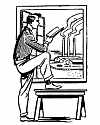 The intense program required to educate our armed forces
and millions of new workers brought into sharp focus the
fundamental difference between basic education and intensive
special training. This great program has produced a three-way
cooperative system consisting of the armed forces, educational
institutions and industry.
The intense program required to educate our armed forces
and millions of new workers brought into sharp focus the
fundamental difference between basic education and intensive
special training. This great program has produced a three-way
cooperative system consisting of the armed forces, educational
institutions and industry.Yesterday, in an incredibly short time, young men were taught to fly a bomber with 7,000 horsepower. Others were trained to maintain and service these great planes. Men were taught to command PT boats and submarines; to become radar experts, and man ships crossing the seas. Our enemies' Blitz warfare was met by our" Blitz training." This supreme training effort was so successful that people quite naturally asked, "If we can do this in wartime, why not in peacetime?" I think we can apply some of our wartime experience to education. Just as it was possible for our knowledge of peacetime manufacture to supply the technique for war production, so our special training programs are the result of the seeds which have been sown by our educational institutions over the past years. If we had not had this broad educational background, we could not have done this spectacular job. |








